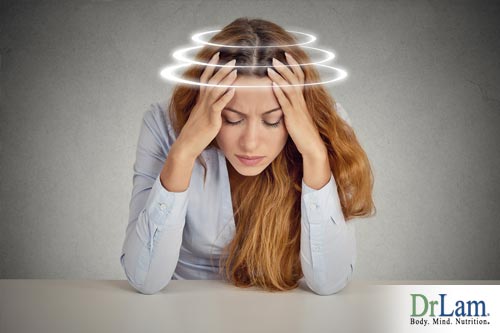
 Dizziness and light-headedness are the most common reasons for doctor visits. However, doctors are sometimes perplexed as to what causes dizziness. Much patience and diligence is needed to find the right doctor who will properly diagnose and then treat the actual cause or causes of your dizziness.
Dizziness and light-headedness are the most common reasons for doctor visits. However, doctors are sometimes perplexed as to what causes dizziness. Much patience and diligence is needed to find the right doctor who will properly diagnose and then treat the actual cause or causes of your dizziness.
There are many possible causes of dizziness. It can often be seen in a variety of conditions. Stress overload and intense anxiety can sometimes lead to disorders of the cerebellum. This happens when sensory signals experience a kind of short-circuit. Many times, an imbalance or unsteadiness results. A dysfunctional nervous system and cardiovascular system can also be the cause of headaches, along with side effects of prescription medications. If you have had a conventional medical work up and no known cause is discovered, it may be time to look at adrenal fatigue syndrome (AFS) as a possible cause.
Dizziness, in AFS, is not the typical dizziness associated with vertigo. Vertigo, in this case, is described as having light-headedness described as a sensation of floating or near fainting. Many times, imbalance and unsteadiness can result. During this time, blood pressure and all cardiovascular and neurological markers are usually normal.
Many causes can be responsible for the AFS light-headedness. Among some, are metabolic issues such as sugar imbalance, autonomic nervous system imbalances, ear problems, and chronic, prolonged, intense stress.
Let us examine metabolic imbalances such as low blood sugar as a potential culprit. Reactive hypoglycemia, where you have symptoms of hypoglycemia but serum glucose level are normal, are commonly associated with AFS. This can often happen in the setting of advanced stages of adrenal fatigue as your metabolism becomes deregulated. In such situations, the adrenals are unable to produce sufficient cortisol, a glucocorticoid hormone. As such, hypoglycemia can result and lead to light-headedness or dizziness. In addition, the thyroid helps to regulate your metabolism as well and plays a role in what causes dizziness. Lastly, low blood pressure, as commonly associated with AFS, due to deregulation of salt balance, may also be a potential cause of dizziness as well. When blood pressure drops, blood flow to the brain decreases and can result in a light headed feeling. AFS sufferers are often dehydrated. The lack of fluid may cause postural hypotension and dizziness. Perhaps the most frequently overlooked cause of dizziness is prescription medications as well as stimulatory glandular compounds and herbs such as maca, rhodiola, ashwagandha, green tea, and licorice. Caffeine, interesting enough, often can reduce dizziness because of its constricting effect (if, in fact, what causes dizziness is hypotension and reduced vascular volume).
The above mentioned multiple pathways that can result in dizziness are often the result of a deregulation of the cardionomic system, which is a part of the Neuroendometabolic (NEM) stress response system, that the body has to react to stress. The cardionomic system revolves around the triad organ systems of adrenals, heart, and autonomic nervous system. When your adrenals are weak, often times, the autonomic nervous system will have to compensate, this may lead to hyperadrenergic orthostatic hypotension, which can be a cause of dizziness. This often happens after taking a hot bath, or standing up too quickly. It can be so severe that you can actually pass out from the drop in blood pressure. Low blood pressure can also be a result of low aldosterone levels. Aldosterone is a hormone that is produced by the adrenals. It functions to help regulate your blood pressure and fluid levels. Low aldosterone means that your body will lose more water and salt, and as a result, your blood pressure will lower.
 Starting out, perhaps as a weakening of strength and energy, AFS may actually have begun years before by burning the proverbial candle at both ends and having chronic stress overload. Advancing, unattended, and misdiagnosed by most physicians, the AFS sufferer wanders from one doctor to another looking for help--and not receiving it.
Starting out, perhaps as a weakening of strength and energy, AFS may actually have begun years before by burning the proverbial candle at both ends and having chronic stress overload. Advancing, unattended, and misdiagnosed by most physicians, the AFS sufferer wanders from one doctor to another looking for help--and not receiving it.
Overtime, you may exhibit an inability to focus or concentrate, a lack of memory retention, having brain fog, imbalance, weakness, mild depression, restless leg syndrome (RLS), an inability to sleep and a gradual inability to do the simplest of everyday chores, are telling symptoms of AFS. Family life is sacrificed, jobs are lost and almost everything in life comes to a standstill.
Thyroid dysfunction is often suspected even though the adrenal glands may be the underlying cause. As a result, medication for a low thyroid is dispensed, and this sets off another cascade of symptoms involving the thyroid gland, one of the most important organs in the human body.
Sad to say, many conventional doctors do not even acknowledge that there is such an illness other than Addison Disease. To even suggest something like adrenal insufficiency is tantamount to being considered a medical quack in some quarters. Many patients leave their doctor's office with the explanation of, "It's all in your mind, you just need a vacation," ringing in their ears. They continue on in a "zombie-like" type of existence where jobs and careers, care for the family and the desire to keep on living ceases.
 When it comes to helping deal with dizziness in the setting of adrenal fatigue, it is important to find the root of what causes dizziness, be it low blood sugar, or blood pressure problems. Often times it can be a combination of factors affecting your body. Helping the adrenals get stronger is one of the main ways to help alleviate dizziness. Here are some suggestions.
When it comes to helping deal with dizziness in the setting of adrenal fatigue, it is important to find the root of what causes dizziness, be it low blood sugar, or blood pressure problems. Often times it can be a combination of factors affecting your body. Helping the adrenals get stronger is one of the main ways to help alleviate dizziness. Here are some suggestions.
One vitally important aspect of AFS recovery is stress management and learning to deal with toxic relationships. Many times, stress overload from undesirable relationships lay at the root of AFS suffering; cutting some of them off may begin the healing process from AFS.
Another aspect of recovery includes lifestyle changes that will be mandated depending on the severity of AFS that the patient is manifesting. Perhaps eliminating a stressful job, changing living arrangements and changing one's work hours are part of the new modifications required.
Helping to resolve dizziness in the short term revolves around managing the cause of the dizziness. If it is from hypoglycemia, eating small frequent meals to help balance your blood sugar is an easy lifestyle change to make. If it is due to low fluid and electrolytes, drinking salt water may help to resolve that. A deregulated autonomic nervous system is tougher to balance, but adrenal breathing exercises are a good method to help calm your body down and regulate the autonomic nervous system.
It is of vital importance that anybody suffering from dizziness gets a full workup to rule out any other possible causes. Dizziness is a serious symptom and can lead to accidents, and as such, must be taken seriously. The right support at the right time can go a long ways to relieve this symptom without damaging the body. Suppressing the dizziness with medications can mask the underlying problem and is not recommended. Supporting the adrenal glands properly, without the use of stimulants, is conducive to the healing process. Always seek professional help. What works for one person may make another person worse. Every body is unique in its response.
© Copyright 2016 Michael Lam, M.D. All Rights Reserved.

